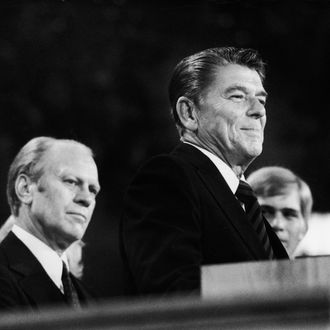
For those who enjoy accounts of the lost good old days of American politics, Politico Magazine is serving up an oral history of the 1976 Republican National Convention. But this is a case where the past could be prelude: ‘76 was the last contested convention in either party, and we can, perhaps, learn from it what might happen in Cleveland and/or Philadelphia in July.
One detail from ‘76 that is especially worth noting involves the party platform, which became not so much a struggle for the soul of the GOP, but rather a struggle for control of the convention via test votes the Reagan forces staged to embarrass Gerald Ford and remind delegates that their conservative views were better reflected by the Californian. But the real lesson comes from how the Ford team responded: by caving. Here’s an excerpt from the oral history:
[Reagan operative Ernie] Angelo: The week prior to the convention, we were constantly working up ideas for platform changes that we thought we could force a vote on and break some of the poor delegates away from Ford. And just about anything we came up with, the Ford campaign would accept.
[Ford campaign manager Stu] Spencer: My biggest concern was something ideological coming out of the platform committee would help [Reagan’s team] steal the Florida delegation. If [Reagan delegates] wanted it, we said, “Give it to them….”
[Journalist Lou] Cannon: The Ford people just gave the Reagan people the platform. I was in some of those platform committee hearings, and the Ford people were under instructions: Don’t get into a fight. “If they want this on abortion, if they want that on defense, give it to ’em.”
Most notably, Jesse Helms drafted a platform plank entitled “Morality in Foreign Policy” that was a very personal repudiation of the diplomatic style and détente diplomacy of Secretary of State Henry Kissinger. The egocentric foreign-policy maven pitched multiple hissy fits over it, but Team Ford swallowed that, too.
The most likely 2016 analogue for this particular 1976 lesson will be the Democratic Convention, in which Bernie Sanders and his forces have already made it plain they will offer a variety of platform planks to place his, and their, stamp on the convention. The odds are high that Clinton would emulate Ford’s tactic of paying off the challenger in the fool’s gold of the platform if it’s necessary to eliminate even the tiniest risk of the convention spiraling out of her control or even of the media dwelling on some “defeat” on the floor.
The possible role of platform fights in Cleveland is a bit harder to predict, but could be central. Suppose, for the sake of argument, anti-Trump forces are fighting to keep the mogul from nailing down the last few uncommitted delegates he needs to win the nomination on the first ballot — but they are reasonably confident a majority of the delegates oppose some of Trump’s signature policies. Why not launch a platform fight to polarize the convention? Alternatively, Trump (or for that matter, Cruz) operatives could try to head off some multiple-ballot dark-horse candidate by putting through a platform that, say, a Paul Ryan would have trouble running on. Why not try?
And that’s the overriding lesson from the past: In the heat of a convention struggle, nothing else matters but the main prize. Words may well be said— or platform planks adopted — that have a corrosive effect on party unity, and can even come back to haunt the ultimate nominee in a general election campaign. The party’s power to control everything, including perceptions, is the important asset a “contested convention” — whether it’s a nomination contest or the kind of party-leadership contest Team Sanders will stage if he falls short on delegates — takes away, in exchange for all the excitement of never knowing what’s next.






























